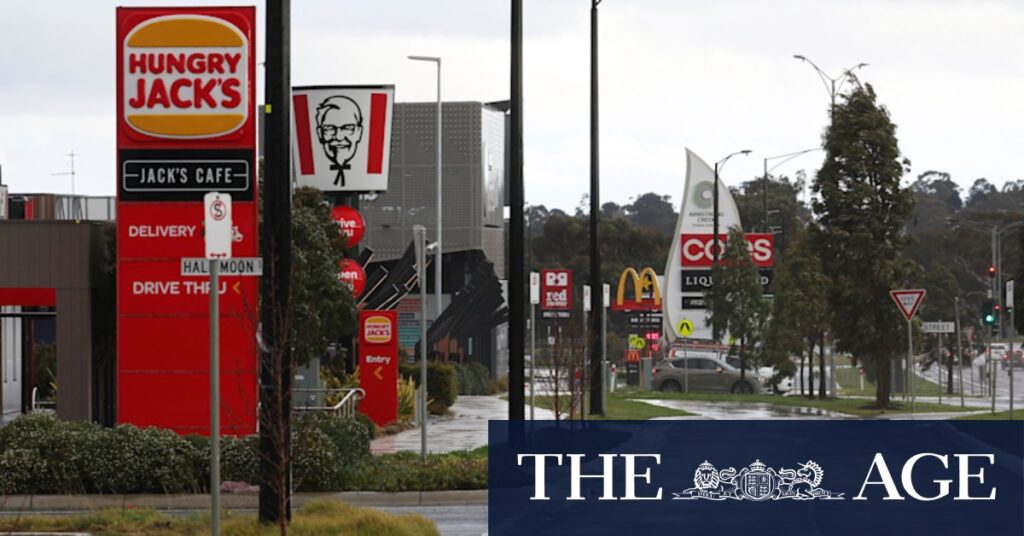
Every day, Julia McKay faces a challenge familiar to many parents: resisting the allure of fast-food giants that have proliferated around her home. As she drives her children along the Surf Coast Highway in Armstrong Creek, a rapidly expanding suburb on the outskirts of Geelong, the sight of Hungry Jack’s, KFC, McDonald’s, and others are hard to miss. “They see it, and so they want it all the time,” McKay laments.
This scenario is increasingly common across Victoria, where multinational fast-food chains are not only entrenched in established suburbs but are now rapidly spreading into growth areas. These chains often set up shop beside undeveloped land, ready to serve the influx of new residents before healthier dining options can establish themselves.
Health Implications of Fast Food Proliferation
The expansion of fast-food outlets in these areas is raising alarms among health experts. Research indicates that living near a high concentration of fast-food restaurants, coupled with limited access to fresh produce, contributes to weight gain and related health issues, such as diabetes and cardiovascular disease.
“A growing body of evidence shows that living near a concentration of fast-food outlets contributes to weight gain, leading to other health conditions,” experts warn.
In response, various international governments have implemented measures to combat this issue. For instance, Wicklow in Ireland has established “no fry zones” banning new fast-food outlets within 400 meters of schools. Similarly, councils across England limit the number of hot food takeaways to prevent oversaturation.
Calls for Policy Changes in Victoria
Despite these international efforts, Victoria has yet to see significant policy changes. A 2012 parliamentary inquiry recommended new planning rules to limit the oversupply of fast-food outlets, but a decade later, no government has committed to action based on health grounds.
Melbourne University epidemiologist Melvin Barrientos Marzan emphasizes the urgency of the situation. “They dominate the emerging growth areas,” he notes. His research highlights a worrying concentration of unhealthy food outlets in urban centers and growth zones like Bendigo, Ballarat, and Geelong, where healthy alternatives are scarce.
“People always say it’s an individual choice, but at the end of the day, it’s actually not. There are structural barriers that can hinder you from developing healthy behaviors,” Marzan explains.
Marzan and other experts are advocating for tougher restrictions on fast-food outlet locations, including buffer zones around schools. They argue that without these measures, the health of residents in these growth areas will continue to be at risk.
Local Business Concerns
Meanwhile, local business owners like Jacqui Doyle of Winchelsea’s La Hoot Cafe are apprehensive about the potential arrival of fast-food chains. “They will be knocking on our door sooner or later,” Doyle predicts, fearing the impact on her business and community health.
Winchelsea, located 43 kilometers west of Geelong, has so far resisted the influx, but Doyle worries this won’t last. “There’s a lot of deep-frying … I don’t think they’re really health-oriented,” she says, concerned about the potential consequences for her community.
In nearby Colac, the presence of five major fast-food chains, with plans for more, illustrates the challenge. The Surf Coast Shire previously rejected a Hungry Jack’s application in Winchelsea, but Doyle fears the determination of fast-food operators will eventually prevail.
Future Directions and Community Action
As the debate continues, health advocates like Diabetes Victoria’s Jenna Van Der Velden are calling for an overhaul of planning laws to prioritize public health. “You’ll see fast-food outlets arrive in these suburbs before you even have a supermarket,” she points out.
The conversation around fast-food proliferation in growth areas is far from over. As communities like Armstrong Creek and Winchelsea navigate these changes, the balance between convenience, business interests, and public health remains a pressing concern.







